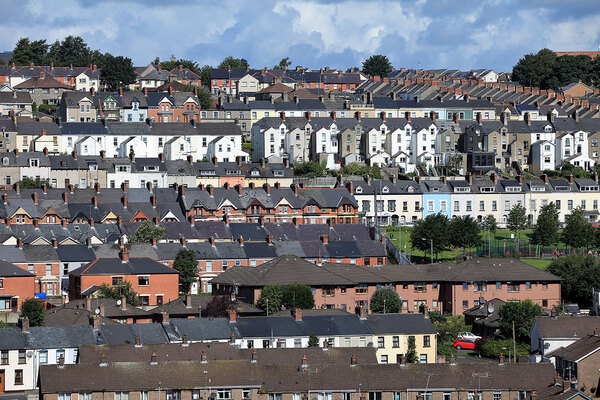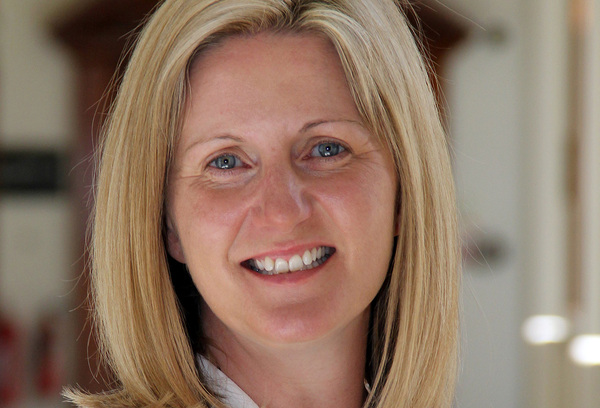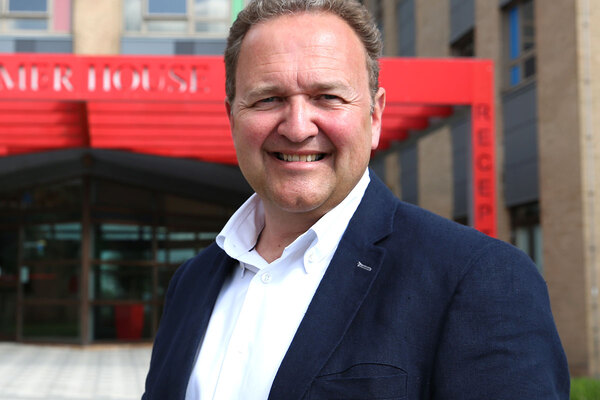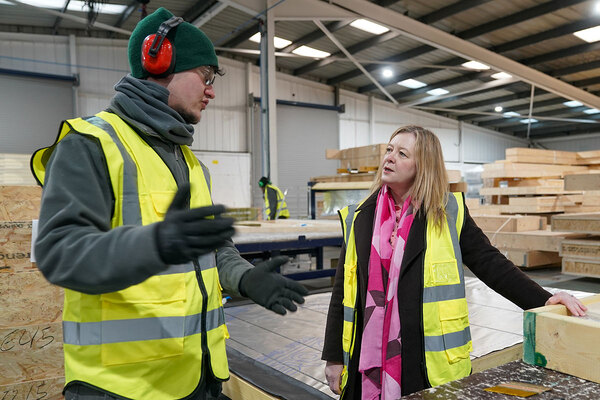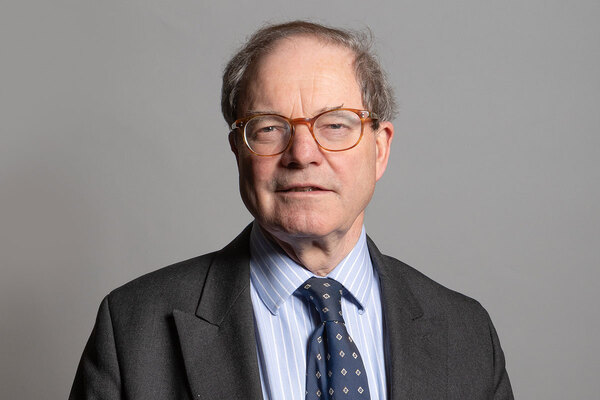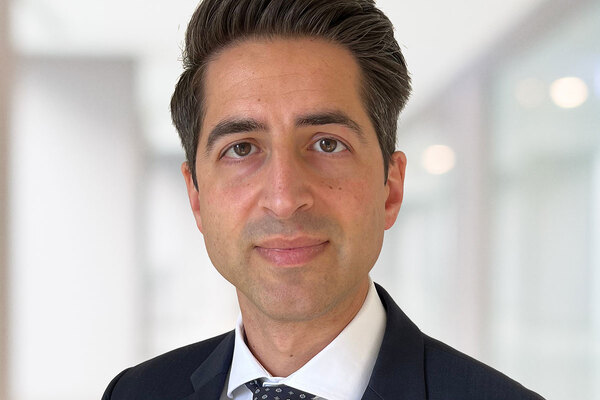You are viewing 1 of your 1 free articles
Playing the Long game: an interview with the NIHE’s new chief executive
The new chief executive of the Northern Ireland Housing Executive speaks to Nathaniel Barker about the responsibility of leading the organisation, reclassifying its status and its building plans. Photography by the NIHE
“It’s a busy job, and rightfully so,” chimes Grainia Long. “But look, to be perfectly honest, it’s kind of how I work. I prefer to work at pace.”
Since taking over as chief executive of the Northern Ireland Housing Executive (NIHE) four weeks before speaking to Inside Housing, she has barely stopped to take a breath. Our interview is a time-limited video call wedged between two others – but when you speak as fast as Ms Long, you only need 30 minutes.
Readers will best know Ms Long as the former chief executive of the Chartered Institute of Housing – a role she took on in 2011 at the age of just 33. In the decade since, which has also seen her lead Ireland’s child protection charity and occupy a senior job at Belfast City Council, she has not lost an ounce of energy.
The NIHE is Northern Ireland’s housing authority. It owns around 84,000 homes – the majority of the province’s social housing stock – and undertakes housing functions such as allocations and homelessness services. In Ms Long’s view, being its chief executive is “the dream job”.
“For me, the Housing Executive, it’s the scale and the nature of its impact that makes this organisation really attractive,” she explains. “Fifty-seven thousand children and young people go to bed in our properties every evening, and that’s a number that I carry with me.
“That’s an example of the scale of the responsibility, that it’s our job to keep children and young people safe, warm and dry. That’s fundamentally our starting point, and then we build on that. And so why wouldn’t that be a role that anyone would want to do? To lead an organisation that has that level of impact is exciting.”
Of course, the pandemic has had a bearing on her experience. “It’s strange doing your housing job from behind a desk, because that’s not how housing is done,” she says. Restrictions mean she is yet to meet a tenant in person or visit an NIHE home. “It’s unusual, it’s not good enough. It’s not how I do housing.”
Ms Long joins the NIHE at a crucial time for the organisation and for Northern Ireland. In November, the region’s government announced that the authority will undergo a restructure, which could see its landlord and regional functions separated into two. Reform of the NIHE has been on the political radar for years, but the situation is now desperate: a severe funding crisis means it currently has no way to pay for the investment required by its huge housing stock, with an annual shortfall of around £140m. A major part of the problem is that its current classification means it is unable to borrow without affecting the public balance sheet.
In a textbook example of her indefatigable optimism, Ms Long’s assessment is that the NIHE “is in a very good place”, with the prospect of reclassification “something that as an organisation we’re really excited by”.
“Fifty-seven thousand children and young people go to bed in our properties every evening, and that’s a number that I carry with me”
In the past there has been a sense that the nature of the NIHE made it powerless to determine its own destiny, but Ms Long is adamant that this is not the case here. “The first thing I wanted to know was: is this being done to the Housing Executive, or is it being done with the Housing Executive? I’m pleased to say it is genuinely a partnership between the department and the Housing Executive, and I’ve every expectation that will continue.”
Work is currently ongoing to assess how much investment in NIHE homes is needed over the next 30 years, updating a £7.1bn figure last calculated by Savills in 2018 to include building safety and decarbonisation costs. The new number, Ms Long says, “will certainly be higher”. Getting it right “is going to be really critical”, she adds, as it will dictate the shape of the reforms.
Together with officials in the Department for Communities, the NIHE has until March 2022 to submit options to ministers on how to meet that investment. After the May 2022 Assembly election, the government will decide on its preferred way forward. In Ms Long’s estimation, it will be “at the very least 2025” before the new-look organisation is fully up-and-running.
“The Housing Executive is 50 years old this year, and what we create has to be around in another 50 years. So we won’t be making rash decisions. We have to take our time here, and what we do has to be in the best interests of today’s tenants and future tenants.”
Back in November, acting communities minister Carál Ní Chuilín said the NIHE would become “a mutual or co-operative designation”. But later, back from a period away with illness, permanent minister Deirdre Hargey said she would like to retain the NIHE’s current status.
So what does Ms Long predict the future holds? “I don’t know, and I’ve said this publicly, I don’t have a preferred option.” So how about privately? “Genuinely not. I’m going to be listening to tenants over many meetings over the next number of months and years on this, and I wouldn’t be doing my job and I wouldn’t be honest with them if I was to sit in front of them and say, you know, ‘we need to look at all options’ and then have a secret preferred option in my back pocket.”
As well as investing in existing stock, Ms Long – and Northern Ireland’s government – is keen to see the revitalised NIHE play a greater role in delivering new social housing. In days gone by it was a major developer, but has built almost nothing since the turn of the millennium when associations took over. Teams within the NIHE are working on plans to build up its capacity and assess what it could achieve in the coming decades post-overhaul, but Ms Long adds: “We’re not waiting until that day… and if we’re able to add to supply in the meantime then we will be keen to do that.”
When the NIHE first signalled its eagerness to build again in 2017, some in the sector quietly bristled. Ms Long is adamant that the current model – where the NIHE allocates development grant to associations – “has worked”. “However,” she presses on, “there is a structural gap between demand and supply and something has to give. We need a new lever now to add to supply and work alongside housing associations.”
It is clear that Ms Long perceives boosting the NIHE’s profile as key to her mission. She returns repeatedly to its economic influence as well as its social impact. There are “very few” other organisations in Northern Ireland that will match the NIHE’s £217m capital investment this year, she notes, with all the associated benefits for the supply chain. “I think we’ve maybe not stressed that as much in the last number of years as we could have,” she muses. “And as we emerge from COVID-19, the Housing Executive will be a key player in how Northern Ireland’s economy improves and recovers.”
“The issue that I’m most concerned about right now today is we do not know what’s going to come in terms of the scale and the nature of mental health issues, and other wider health conditions”
Steering the NIHE’s course towards revitalisation is only one aspect of Ms Long’s job. During the pandemic, temporary accommodation placements across Northern Ireland have soared a staggering 149%, partly as a result of work to bring rough sleepers off the streets. Homelessness, she says, is her major priority. In particular, she wants to see the number of families in emergency accommodation “reduced right down and only in exceptional circumstances”.
Meanwhile, she must find a sustainable future for the Supporting People programme, used to fund housing-related support services for vulnerable groups including homeless people. The annual budget has been frozen at £72m for several years, but demand is growing. Officials in the NIHE are finalising a new strategy for the programme – having had to redraft it to take account of the pandemic. “There are no easy solutions,” admits Ms Long. “The issue that I’m most concerned about right now today is we do not know what’s going to come in terms of the scale and the nature of mental health issues, and other wider health conditions, the complexity of some of the challenges for particularly young homeless people.”
Then there’s the NIHE’s ongoing community cohesion work, the importance of which was recently thrust into the spotlight through the scenes of violent unrest in Northern Ireland – including on social housing estates. For NIHE staff on the ground striving for desegregation, Ms Long says: “That work is daily work… and it will be before us for quite some time to come.”
Ms Long’s energy and optimism is a contrast to her predecessor, Clark Bailie, who at times seemed a little jaded. In his defence, this may well have been instilled by the experience of working within a political environment that can be slow to deliver results.
Perhaps above all, her real test will be whether she can maintain that sunny outlook for another 10 years.
Sign up for our Northern Ireland bulletin
Already have an account? Click here to manage your newsletters



